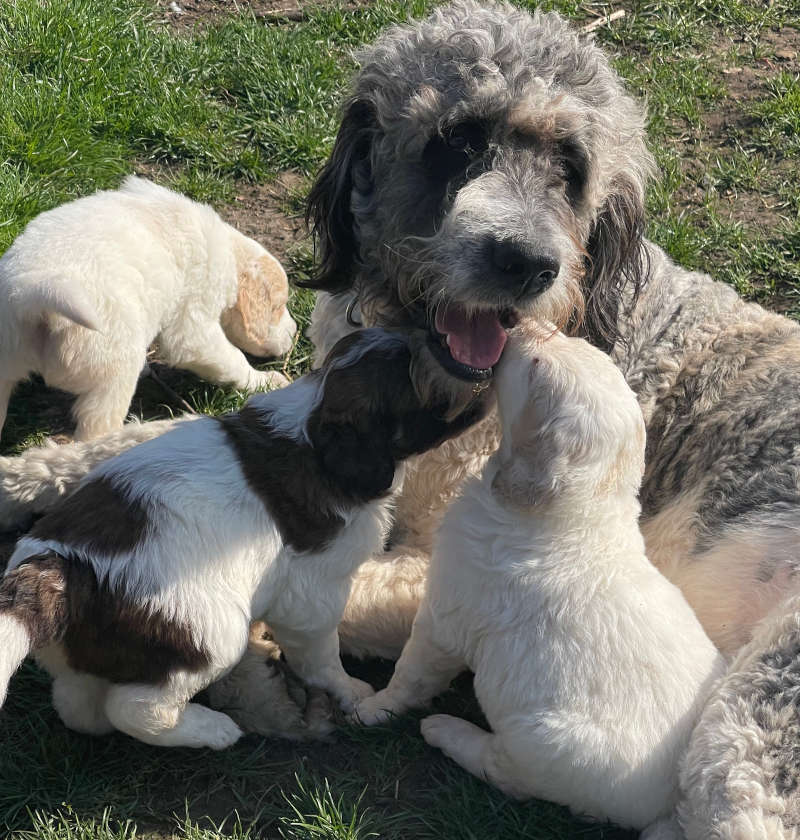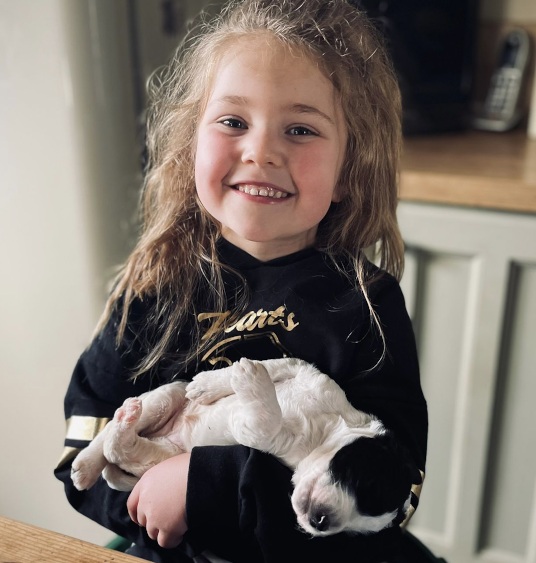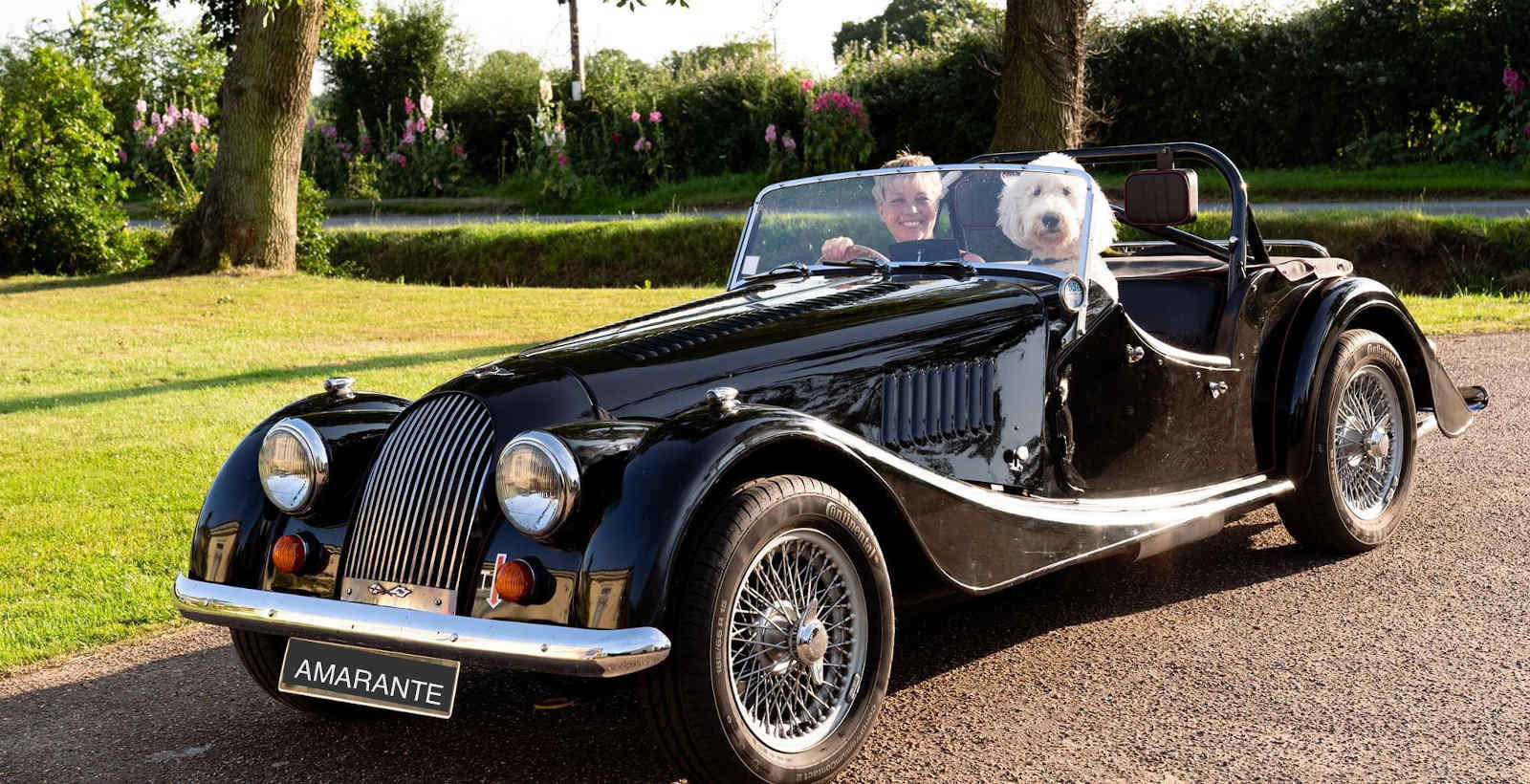
Getting a Puppy
Bringing home a new, furry family member can be the most exciting time, but it can also be a little daunting!
Our St Berdoodle and Sheepadoodle puppies are raised as truly part of our Amarante family and make such wonderful, loving pets. As such, we have put together a little guide to help our new families avoid any potential problems later on. We ask them to please, please, please if they have any problems, concerns or anything they are unsure of, to get in touch.
We have a Facebook group Amarante Doodles UK and I start a private chat group for every litter for them to ask questions directly to me and share experiences. I am told this is a very useful platform.
In this guide:
- - Feeding
- - Worming
- - Vaccinations
- - Grooming
- - Training
- - Exercise
- - Toilet Training
- - Settling In

Feeding
We feed our puppies four times a day at approximately 7.30am, 12.30pm, 5.30pm and 10pm. Nutrition is particularly important with a large breed dog for bone and joint health, especially in the growing stage. Choose a good quality brand and make any changes gradual. Do your research on the food you choose, there is a good website www.allaboutdogfood.co.uk and make sure you avoid the bad ones! Gradually decrease the number of meals to two per day, but never go less than this because of the risk of bloat.
I add a little water to their food, which releases the flavour of the biscuits and again helps guard against bloat. I do this for my adults too. I also add a little meat, meat juice, sardines or about a dessert spoon of good quality wet food. They love it with raw tripe added! Pick up what they leave so you are in charge of when they eat and they’ll very soon learn if they don’t eat it, it goes. For behavioural reasons never allow them to graze.
To avoid food guarding, occasionally put a little meat in with your hand while they are eating then they associate a hand giving rather than taking away. Never take their bowls away from them! Always provide fresh water. Do not give milk. Keep treats to a minimum and avoid hide chews and cheaper brand ‘treats’.
If you have children, or Grandchildren, involve them in the feeding so the puppy learns his or her place in your pack from the start. I always give a puppy pack with some of the food they are used to so you can gradually change to the brand of your choice.


Worming
We worm our puppies with a 3 day course of Panacur 10 at two weeks old and at 5 1/2 to 6 weeks we worm again with a worm tablet such as Milpro. I recommend taking your vet's advice as to how to go forward but they won’t need to be wormed again until 9 weeks old.
Vaccinations
Allow your puppy a couple of days to settle in their new home then take them to the vet for their first vaccination.
The injection itself doesn’t hurt the puppy so stay relaxed yourself so a visit to the vet doesn’t become a problem. They pick up on our stress and energy.
Grooming
The ‘oodle’ of your doodle will require maintenance. Their ears will need plucking from about six months of age. Their bottoms will need to be kept trimmed. It is also a good idea to have the fur on his or her toes clipped in the grass seed season and keep an eye out for mats between the paw pads. Keep handling their feet, between their toes, ears, eyes etc as frequently as you can in the early stages so there’s no problem when they are older. Doodles require regular trips to the groomers or alternatively buy some clippers and do it yourself.
Training
We start the basics like not getting attention when they jump up, recall by calling ‘pup pup pup’ or clapping our hands, or blowing a whistle at meal times.
I would recommend you don’t allow rough play or tug of war games with you or anyone and ask my new families if they have any problems to contact me and not be afraid to ask me for help. Any situation or noise, which might be frightening, is best ignored and treated as ‘situation normal’. If you even feel: ‘there there don’t worry’ that will come across to the puppy that there is danger. We play them the CD of noises so they are desensitised to the sound of guns, thunder, fireworks etc, so to avoid undoing this training, make sure no one reacts in any way, especially during the dreaded firework season.
When it is time to start walking your puppy on a lead I recommend the gundog nylon slip leads so they can’t slip their collar or a normal collar and lead. Please do not use extendable leads for many reasons, one is that the puppy learns to go where he or she wants and you follow, so who is the leader here? I am also not a fan of harnesses as they are designed for pulling! They position the dog to stand slightly in front of you so again, who is leading who? That won’t bode well when you ask for respect or recall. If you have problems when you get to this stage please ring or come and see me as I can help. Tricks such as ‘sit’ and ‘paw’ are fun but the most important thing to teach your puppy is recall. I use a whistle as they can pick up any stress or anxiety in our voices. Don’t overdo it or they will be like children, become deaf to our nagging. But when you do blow that whistle follow it through. The main thing to remember is most problems associated with doodles stem from attention so ignoring is the best way to deal with most issues. If you are introducing your puppy as a second dog to the family I can’t stress enough to let them sort their pecking order out themselves, in other words don’t interfere, especially at the beginning. It is very easy to over fuss and spoil your puppy in those early days but in doing this you will have a demanding puppy who thinks their place is on a pedestal with a title to their name. Yes they are cute, cuddly and lovable, but they need to know they are a dog, not god.


Exercise
Don’t overdo things while they are still growing however they must have enough off lead exercise to avoid problems with behaviour and relieve stress. Let them off lead as soon as possible when in the insecure stage as I promise they will come back to you, and reward this. Ball throwing is not a good idea as the sprinting, twists and turns are the worst kind of exercise for growing joints.
Toilet Training
We train our puppies from a very early age by keeping the sleep area clean and fresh and the toilet area slightly soiled, but of course not dirty. They prefer to go outside but obviously that’s not possible all through the night. Always praise good behaviour but don’t punish bad or you will have a dog who is afraid to go to the toilet in front of you. As we work hard on this, treating them may confuse the issue as they already know what is expected. Take them out when they wake up and straight after meals, you will soon learn the signs. I don’t agree with using a crate with a closed door to train one of our puppies as they have been brought up to not soil their sleeping area. The exception to this would be a crate by your bed at night when you are next to them if they ask to go out. That said if they do ask don’t give them any attention, not even a ‘good dog’. Put them straight back into the crate when finished and get back into bed. Attention at this time will mean the next night you will find that little whine to go out will be earlier.

Settling In
Puppies leave us with our signature ‘smelephant’. This is a soft comforter toy which has on it the scent of the puppy’s littermates, Mum and me. We have found this helps them settle in their new home.
I am here to help the puppies I raise for life and ask my new puppy families to keep in touch!
